Disclosure: Meeple Mountain received a free copy of this product in exchange for an honest, unbiased review. This review is not intended to be an endorsement.
“The world is not in your books and maps, it’s out there”
Scott Almes has a professed love of books with maps inside the front cover. I can get behind that. Maps carry an inherent sense of adventure—the intersection of the unknown and the (perhaps misguided) sense that you are in control. He cites specifically an appreciation for JRR Tolkien’s cartography which I believe should be universally agreed upon.
It is fitting, then, that the box for Almanac: The Dragon Road is designed to look like an oversized adventure book. It is also fitting that the spread inside the cover page of the game’s Rules of the Road is a color map complete with a spray of dashed lines and arrows leading to the Dragon City.
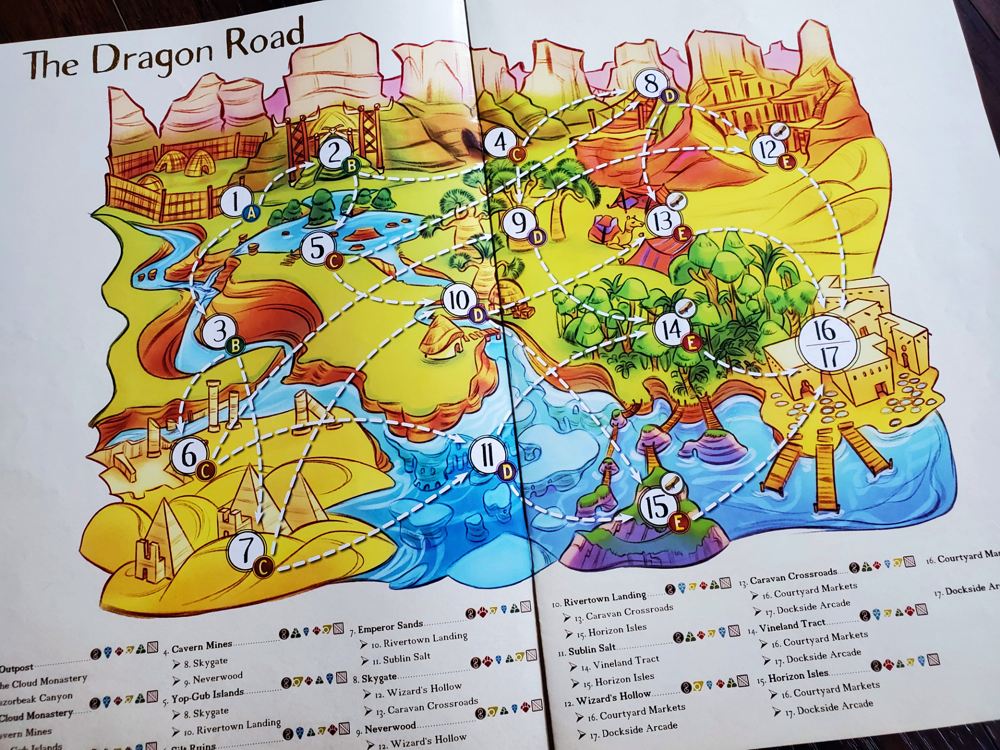
With The Dragon Road, Almes (Lovelace & Babbage, Warp’s Edge) and the folks at Kolossal Games (Western Legends, Reload) have created a storytelling effort that bears a number of marks in common with the legacy genre—shifting settings, dangers, mechanics, and rewards. With every turn of the game’s book/board pages, The Dragon Road builds on its own foundation and presents travelers with a new experience.
“I am looking for someone to share in an adventure”
Almanac: The Dragon Road is a worker placement game played out on the ever-turning pages of the game book. Each two-page spread features a location along the Dragon Road on the right and the continuation of the adventure and rules on the left. Players will visit six locations in every game, beginning always at the Outpost and ending at one of two possible destinations inside the Dragon City.
Players are given a set of six workers, though they will only begin the game with access to three. They also receive a starting Caravan card to hold resources, and a shield to match their color. Behind that shield they will start with a sum of gold and two unfulfilled Contract cards.
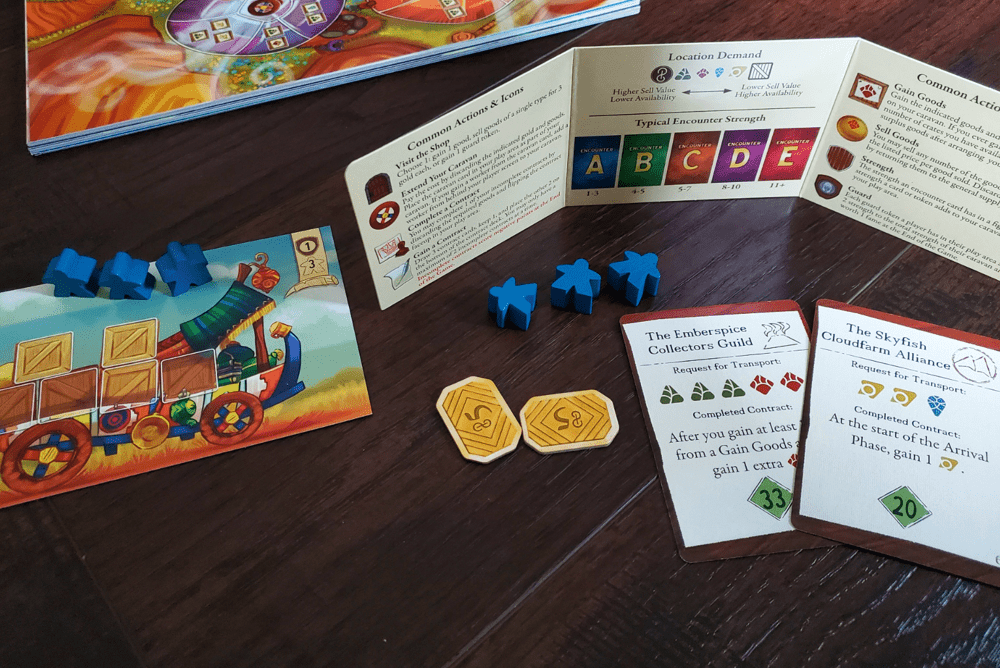
Turns are very simple. Place a worker in turn order and interact with the space. Along the way, the name of the game is collecting resources and utilizing them to expand the Caravan, fulfill contracts, or fill the pocketbook with gold. Each of these items will translate into Fame points at the end of the game. When players run out of workers, the round ends.
The Caravan is the storage center for resources and special tokens. With each additional caravan card, players gain needed space and a potentially healthy dose of Fame and Shield points, which come in handy in the Encounters that emerge in between rounds. Perhaps most significantly, many of the Caravan cards allow players to increase their worker count by one. Extra actions equal extra points in the end. In each round, there are Caravan cards to match the player count, but the spaces on the board that allow these purchases are somewhat scarce.
Contracts are fulfilled at a cost of collected resources and grant players lucrative in-game bonuses and end-game Fame points. The acquisition and fulfillment of Contracts is perhaps the most cutthroat endeavor in the game. Having the right resources at the right time to claim the limited spaces can seal or devastate hopes of victory.
These slim pickings make the role of Guide most intriguing. At the end of each round, players bid to become the Guide for the coming round. The bid involves taking an amount of gold in hand to be revealed at the count of three. The player who bid the most becomes the Guide, but only pays the amount of the lowest bid. In my experience, this means hands full of gold in the hopes that the leader will be devastated financially in exchange for the right to go first. However, there is also value in concealing the size of gold stores behind the shield, so bidding might not involve all of the gold in the game.
The new Guide then chooses from two options on the map and leads the group to a new page with new mechanics and new opportunities. The only advance warning is a scale revealing the available opportunities for each resource in each location—both to acquire and to sell. Obviously, familiarity with the game lessens the surprise, but we like making our decisions based only on the sliding scale and the accompanying picture.
Once a location is chosen, the Guide reveals the next Encounter card. Encounters come with a mixture of blessings and curses. Here the travelers might have to defend themselves against any number of threats. In the event of a fight, players count the shields on their Caravan cards and any acquired Guard tokens before rolling a die to supplement their strength. Sometimes the leader fights alone. Often the travelers face threats one at a time until someone wins or all have been penalized. Just as often, the card is an unexpected gift of gold or resources. Encounters keep every experience fresh and interesting.
Players then arrive at the next location and familiarize themselves with the specifics before doing it all over again. Each game will visit six of the game’s seventeen locations after which players will tally their Fame points to determine a winner.
“It does not do to leave a live dragon out of your calculations”
I can’t say enough good things about Almanac: The Dragon Road. Of course, I say this with my tongue ever so slightly in my cheek.
I’ll get the irony out of the way first. There is one good thing I wish I could say about Almanac, but I just can’t. There is an aesthetic disconnect. I’ll try to explain. The story of The Dragon Road takes place in the fictional world of Baeloria. The stories in every location are engaging and fun. Jacqui Davis, who has worked on titles like Cubitos, Ex Libris, Euphoria, and even Viticulture, has illustrated the world with a unique charm, so I can’t complain there, either. From the box cover to the maps, there is artistic cohesion.
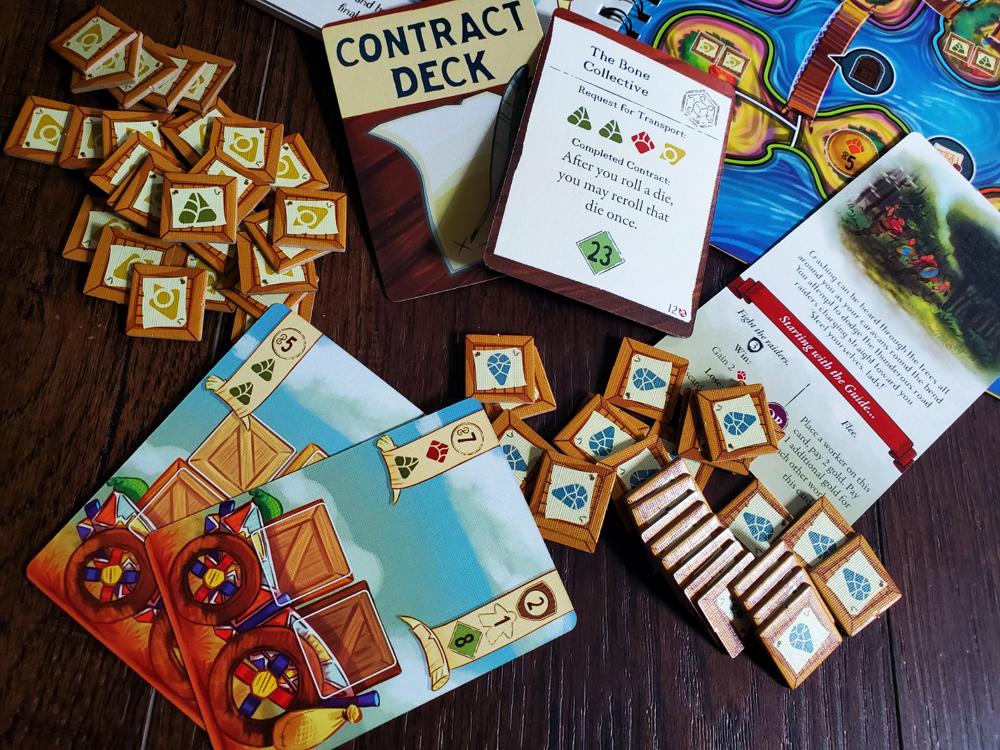
But several elements in the world are… off. The resources—dewleaf, emberspice, everice, and skyfish—have strange names and rather abstract symbols and are therefore only ever called green, red, blue, and yellow during play. I would rather be gathering generic carrots and flowers if I could call them carrots and flowers, just to open the possibility of feeling like I’m in another world. The design on many of the tokens is void of the charm present on the maps and in the stories. Then there are the cards. The Caravan cards fit. The Contract cards just don’t. It’s hard to explain, but the aesthetic is fractured just enough to keep me from saying, “Amazing!!”
I’m not sure if it’s a rift between artwork and graphic design or something else, but it feels to me like the design team tried too hard in some areas (bizarre resource names) while not trying hard enough in other areas (a consistent visual experience). The result is a disconnect that leaves me somewhat disinterested in the world.
“There is a lot more in Bilbo than you guess”
With all sincerity, though, I just can’t say enough good things about Almanac: The Dragon Road.
The Dragon Road is brilliantly designed with respect to gameplay. Having now played several games that have spanned every player count and every map in the world, I am so very impressed at how Scott Almes has crafted these mechanics to create a world of varied tension on a series of small maps.
Our first play was at two players, then three. The Dragon Road is fairly open at two, and still quite forgiving at three. At this point, I was worried that the boards wouldn’t be able to bear the four-player count. I was wrong. There are no board or resource modifications for player count—the spaces on the map simply fill at an ever-increasing and alarming rate. Still, the four-player experience might just be my favorite. The brain-busting tension was fantastic, and we had our most dramatic moments specifically because of the pressure of maps packed with meeples.
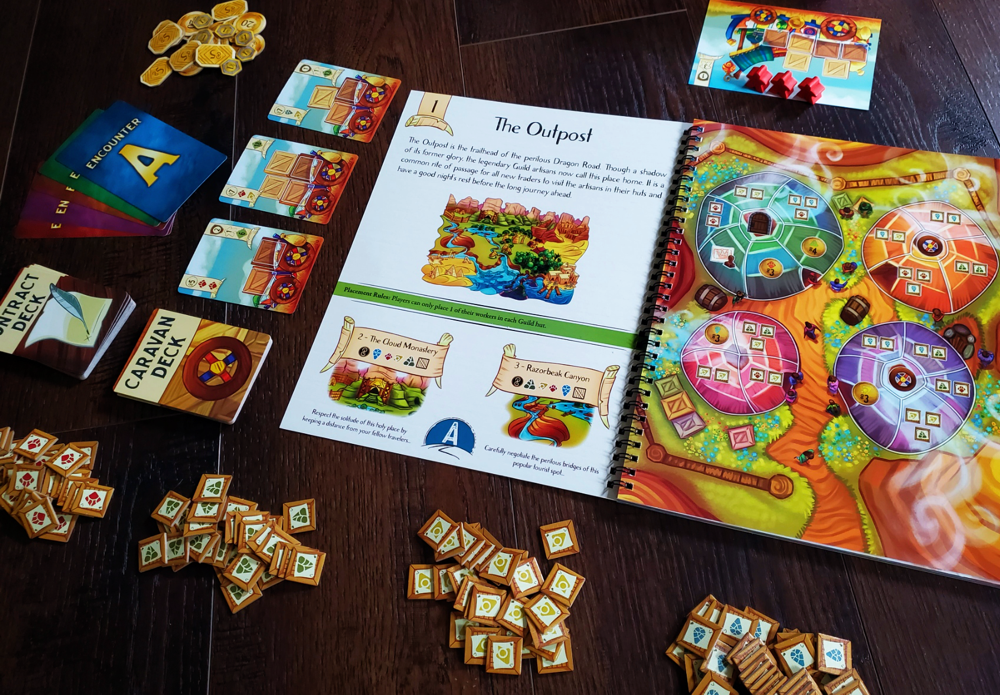
The four-player experience highlighted the ways The Dragon Road pushes players into various strategies. There is balance along the way. As one or two chase Caravan expansions, others will chase Contracts. All along, someone might be straight up hoarding gold. The result of the full table was a series of great reveals at the end as players examined the endgame Tokens they had acquired along the way.
In our most recent play, my daughter needed to have the most gold for an endgame bonus and she grinned as she revealed her 140 pieces—only to then slump in devastation to realize her father had acquired 141. What?! I love moments like that. Meanwhile, my wife fulfilled five contracts and danced to within a few points of victory. My son had acquired seven Caravan carts and a load of points! Since everyone had chosen a different path, we had no clear idea who had won when we crossed the finish line. The result was four mammoth scores within 20 points of each other. No matter who won, the experience was delightful!
The bidding experience at the end of each round is interesting. The only way the system breaks down is if one player makes no provision for gold. The last thing you want is a player to be able to buy the Guide privilege the whole time without a steep cost. Most often, folks were throwing 15 and 20 gold pieces out just to make sure the Guide would pay a hefty sum for the right to choose from the blank slate in the next round.
There are many ways in which the Almes-manac is the quintessential worker placement game. Place workers. Gain resources. Buy things. Satisfy some obligation. But the sweetness here is in the variety presented by each map. Place workers—but you can’t place workers orthogonally adjacent to your own workers. Place workers—but you must progress along the stream with each successive worker—along with everyone else, which means fewer and fewer viable spaces throughout the round.
The quirks are lovely.
The flavor mechanics that accompany each additional map also provide enough variety to make every game different. One map might have you drawing tokens with the thrill of push-your-luck. Another might have you straight gambling by rolling the dice in hopes of selling your resources for a profit. Another might give you a token requiring you to visit a specific map—forcing you to acquire the Guide token at particular decision points. Almes and the Kolossal team have built a fresh experience along this road. With 17 maps, the combinations are plentiful.
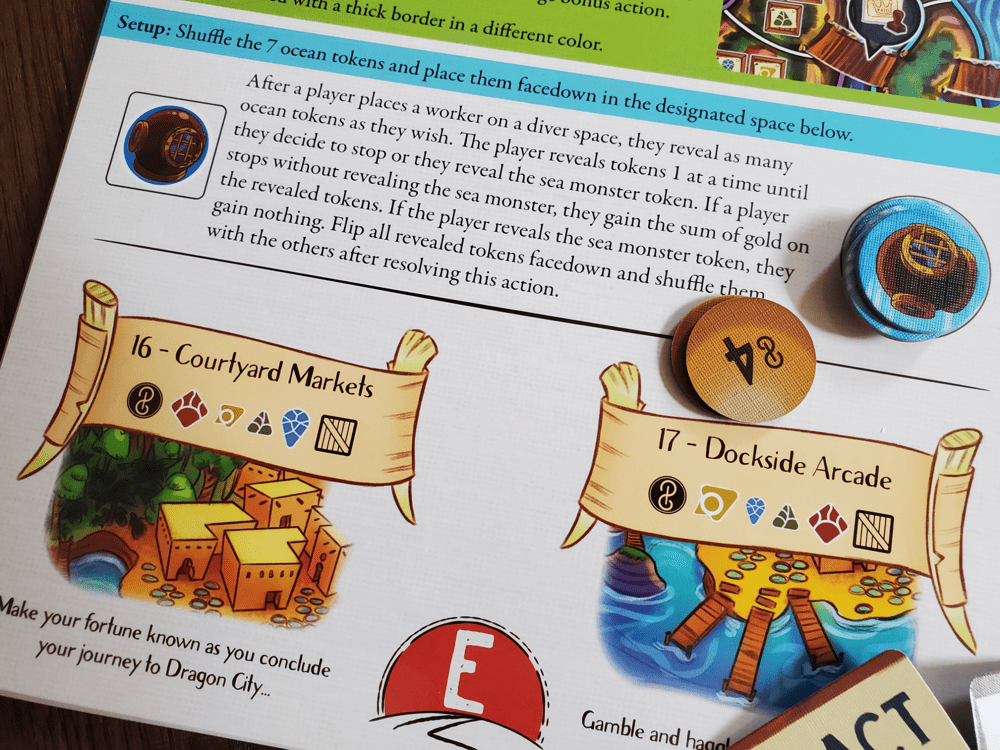
I am enamored with the idea of the legacy game, but they are typically such a hefty time commitment. Plus, there aren’t many that can accommodate my oversized family. The beauty of Almanac: The Dragon Road is that the legacy vibes are alive and well, but the time is condensed so you don’t have to leave a couple kids out of a massive journey. You can always play twice to incorporate everyone. Sadly, you don’t get to tear up cards and put stickers everywhere. But in the name of catching the vibe while I wait for the next legacy experience for my family, I’ll take this hour-long romp across a foreign land.
Folks who love Baeloria will be thrilled at the potential of the second Almanac title, The Crystal Peaks, which was successfully Kickstarted in 2021 and will deliver later this year. The second experience included components to blend the two game books into one massively mixable adventure.
I’m happy to say nice things about this title. Though the visual presentation raises one eyebrow high, the gameplay here far outshines the aesthetic hiccups. I love The Dragon Road. I say give the Almes-manac a chance.


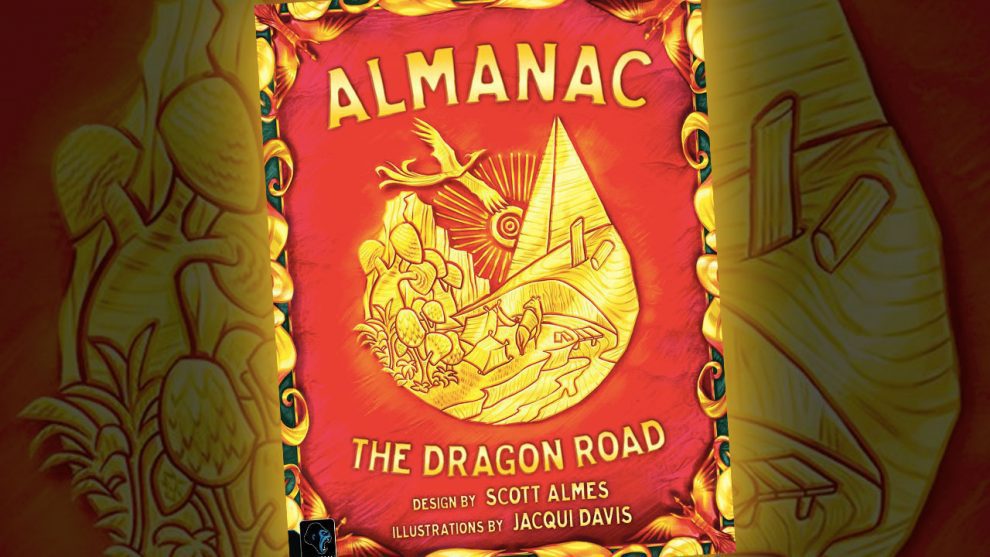



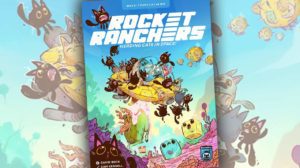





Add Comment